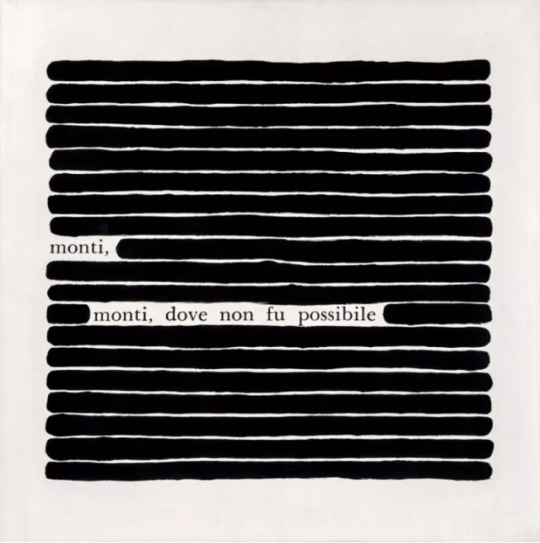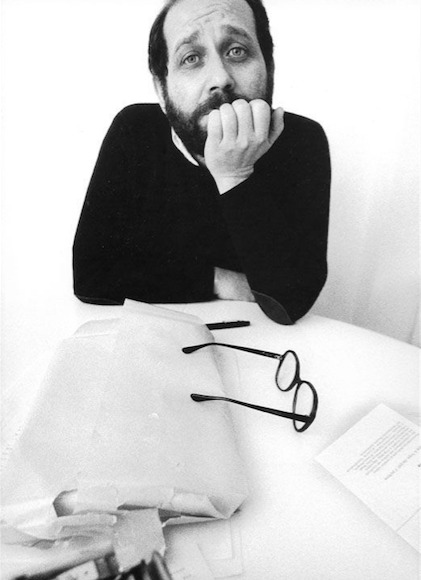#sole e pioggia resurrected
Photo



DELEO ERGO SUM
eclisse inspirations, vol. II
Emilio Isgrò, La cancellatura e altri particolari (1993)
[from Alberto Fiz interview with Emilio Isgrò, 2013]
In 1964 the Erasure (”cancellatura”, artistic movement -EDIT) was born. What were the reasons that led you to such an evasive gesture?
The idea that art was not an object to hang on the wall or to present on a basis, but rather a social tool for discussion and growth. For me it was equivalent, then as today, to a formative process that allowed the circulation of new ideas. At the beginning of the Sixties I was a journalist at the 'Gazzettino' ( 60s italian newspaper -EDIT) in Venice, where I was involved in culture news and themes. Once, correcting an article, I suddenly realized that erasing had more power than words. It was a revelation for me, and from that moment on I undertook a radical operation, destined to upset the rules of the system, so much so that it coined extremist slogans, like 'The word is dead', which caused quite a stir. It was evidently an exaggeration, but it described well my mood and the desire to react to the fullness of words that Western culture had done. In the world of art, then, the correspondent of the word was the image of consumption, which with Pop Art had taken over, becoming too cumbersome.
So curious that a resolute criticism of the word came from those who, like you, attended the literary avant-gardes and had formed with the poem by publishing a collection appreciated by Schwarz (italian editor -EDIT) as Fiere del Sud.
My position, on closer inspection, allowed the word to strengthen itself and to recover an energy that was fading away. 'The word is dead' was the point from which we had to start again. My activity as a poet, therefore, was not at all in contradiction with that of the canceller. I would say that the first was the premise of the second. From the niche literature I passed to an action that interferes with the whole communication system.
Anyway, poets did not think so...
In fact, the erasing profoundly shook the literary world, and not everyone took it well. Eugenio Montale, who appreciated my work as a poet, refused it without hesitation. With him we created a friendly relationship, and often came to the editors of the 'Gazzettino', from where we started to take long walks through the streets of Venice. When I showed him the deletion, he was very upset, and we have not been there since. More available Pier Paolo Pasolini, who for another had favorably reviewed Fiere del Sud, but perhaps he had not fully understood the deletions, even though they were somewhat suggestive. He told our common friend Elsa De Giorgi that he did not approve of them, but that “Isgrò could afford them”. Those who did not have doubts, however, was my friend Andrea Zanzotto. [...] On balance, however, I could say that the art environment had implemented the erasure better than the publishing world [...]
After all, you have always been a loner and of Erasure you were not only the creator and the theorist, but the president and the sole administrator of Cancellatura s.p.a., (a center of creative thought that could not make other proselytes -EDIT)
The erasure is an individual and in some ways solitary path whose results lead to an irreparable split, also from a theoretical point of view, with respect to the avant-gardes. It is an absolute gesture, with no return, far from Dadaist nihilism. In the words of Joseph Schumpeter [Austrian economist of the beginning of the century, -EDIT], I could say Erasure is a form of creative destruction.
Can you make this clear?
The gesture is absolute, but the action has nothing dogmatic. On the contrary, it is a dialectical and relational one. Erasure is the brick used for the construction, or better still, the zero in mathematics, called to form all the numbers and all the values. Compared to a hierarchical and vertical system like the one imposed by the avant-gardes, Erasure represents a highly innovative linguistic hypothesis. It is not a gesture like the others, but it is the questioning of one's gesture on the basis of an operation where the artist himself erases his hypertrophic IO. The avant-gardes needed to find an enemy to fight, an aesthetic or political movement to oppose. I do not have the problem of killing the father, and Erasure develops as a cathartic action that does not seek clash with social principles, but undermines its foundations, freeing the viewer from a passive position of pure contemplation.
But from Malevich to Twombly, from Schwitters to Rotella, delation, albeit “in nuce”, is a well-known theme in the art of the 20th century. Why did you choose to make it the central aspect of your research?
Even the apples that fall from the trees were well known in Newton's time. Only that only Newton noticed it. I, unfortunately for me, are certainly not Newton, and this hurts my self-esteem. On the other hand, such frustration did not stop me from immediately understanding that the deletion is a kind of black hole around which the universe of words gravitates and human communication in general. And as for the artists that you quote, yes, it is true, they also deleted them, but they did not even notice it ... because they canceled functionally, in a state of necessity, perhaps to correct their errors in drawing or perspective, without even realizing of the creative potential they had in their hands. El Greco also erased the sky, filling it with angels, cherubs and focomelic cherubs. Not to mention Mondrian, who would have arrived at absolute abstraction by erasing the leaves of a tree. In my case, however, this hypothesis is reversed, and the true subject is precisely the negation as an indispensable premise of the affirmation. What seemed impossible, becomes possible, with all its charge of ambiguity. I can reiterate what I said twenty years ago: 'the hand that cancels is the only one that can write the true and the false together' ".
Do not you risk, therefore, of moving from the nihilism of the avant-gardes to the indifference of Erasure?
This eventuality does not occur because Erasure sometimes pretends to be neutral, but sometimes takes position, as it interrupts the flow of communication, changing its orientation in an unpredictable way. It avoids any form of taboo or symbology, placing itself at the right distance both from the past and from the present, without any preclusion. Perhaps this is why it was particularly appreciated by the postmodern [...]
Why did you decide to delete the word and not the image?
It probably influenced my poet's past. In an age with a high ideological rate, then, intervening on the word was a much more corrosive action. In the past, the most extreme gesture had been made by Mallarmé, proposing the blank page as the last, supreme possibility of poetry [...]
So, in 1964 you began to delete the newspaper articles, then move on to the works of thought, so much so that in 1970 launched an attack on a monument of culture and on the occasion of an important exhibition by Schwarz present the Encyclopedia Treccani canceled.
That was an act that created much controversy, as it struck one of the pillars of Italian identity. It was certainly not a gesture against culture, but an opportunity to rethink it in renewed terms [...]
Does not the erasing run the risk of remaining a stuck gesture, unable to renew itself?
Absolutely not. Unlike other signs related to the neo-avant-gardes, Erasure is never aseptic or static, but is relational. It has the ability to absorb the context by continually changing itself. If you cancel the devil, it is diabolical, if you cancel God is divine. In this way I could get to the Mona Lisa or to the Last Judgment.
In other words, a delirium of omnipotence!
A methodology that allows me to act taking charge of the subject, and this radically changes the perception of the sign, avoiding any form of rhetoric.
What is the difference between erasing the Treccani Encyclopedia or the Constitution, two acts carried out forty years later, the first in 1970, the second in 2010?
First I canceled a monument of culture; then a social pact of a people in danger. Erasure, therefore, always arises as a solution to a problem. When I delete the traces remain, but no longer the premises from which I left, or the problem. The erasure is not simply a denial, but has the capacity to revitalize the context and, as the poet-psychoanalyst Basilio Reale wrote with long-sightedness many years ago, it is 'a supportive therapy' to the word. How to say a homeopathic cure, a cardiac massage in front of the television chatter, the bulimia of a stereotyped language, slogans to be scrapped, and tormentoni like 'aiming at growth' or 'Europe asks us'.
But did not you say that the word is dead?
In fact, it is dead and must be resurrected through Erasure. “Nous voulons effacer, nous voulons rêver”. “We want to cancel, we want to dream”. These are the only words that I saved from the cancellation of the Manifesto of Futurism I made in 2012 for the Mart in Rovereto.
other works (selection):
non-fiction
La cancellatura e altre soluzioni, Skira, 2007
theater
L'Orestea di Gibellina e gli altri testi per il teatro, Le Lettere, 2011
poetry
Fiere del Sud, Schwarz, Milano, 1956
L'anteguerra, Einaudi, Torino, 1963
Brindisi all'amico infame, Nino Aragno Editore, Torino, 2003
fiction
L'avventurosa vita di Emilio Isgrò, Il Formichiere, Milano, 1974
[Interview taken from the volume: Emilio Isgrò, Come difendersi dall’arte e dalla pioggia, Maretti Editore, 2013, pgs. 266, € 22.00]
2 notes
·
View notes